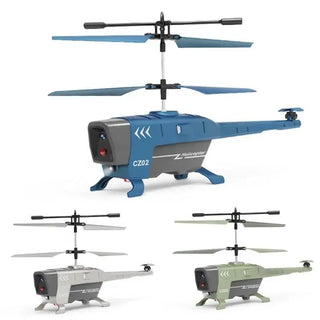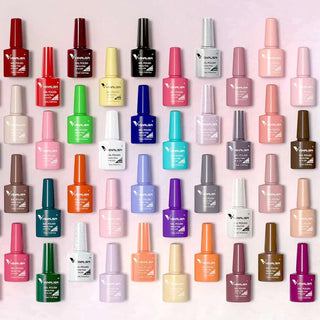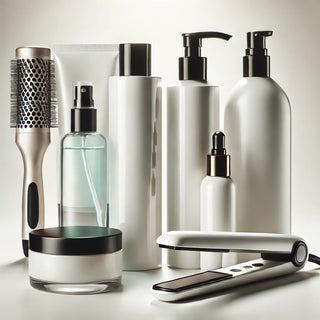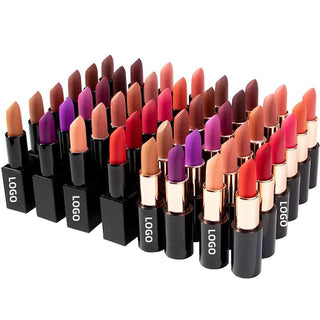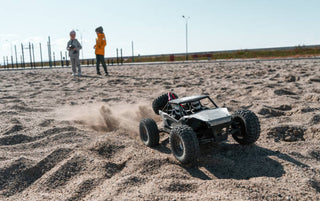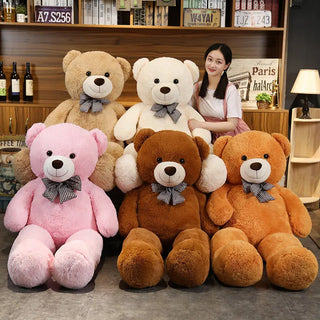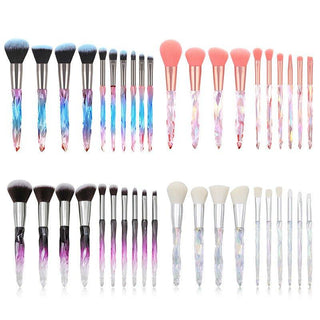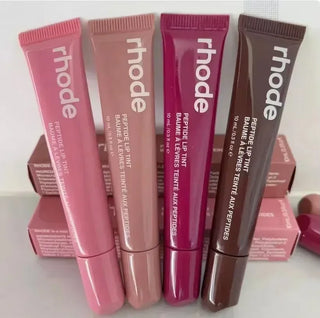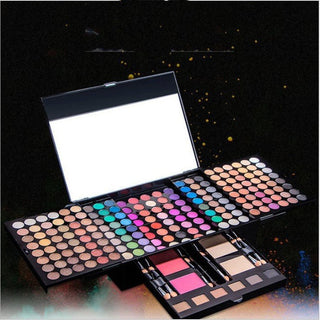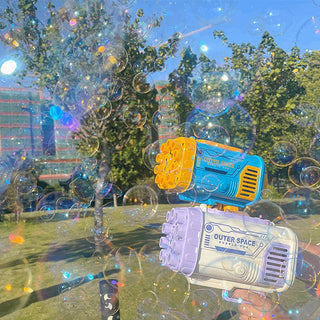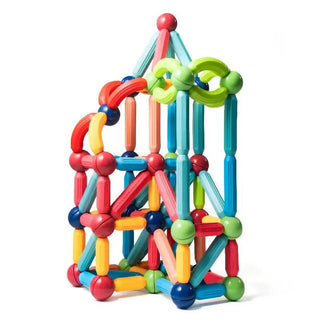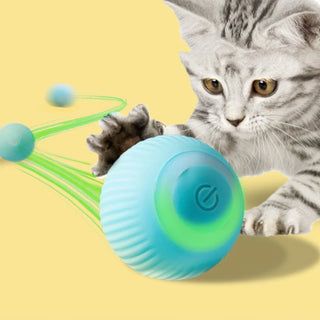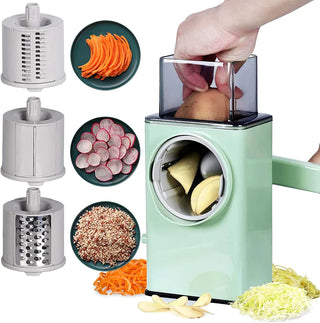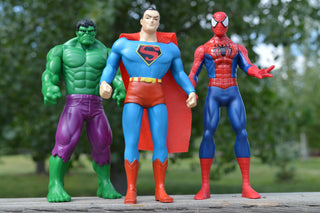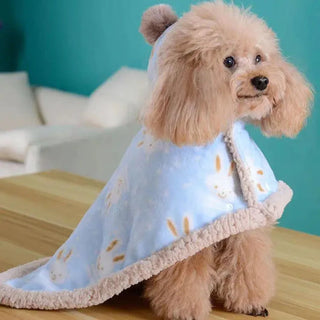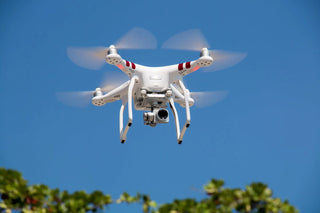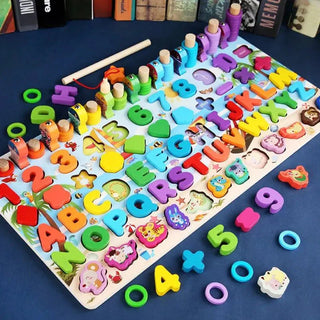Hey there! So, you've probably noticed how educational toys are everywhere these days, right? They aren't just about keeping kids busy anymore. Nope, these toys actually help kids learn and grow in so many ways. From boosting their brain power to helping them make friends, educational toys are like little teachers in disguise. Let's dive into how these toys are making a big difference in child development.
Key Takeaways
- Educational toys are more than just fun; they help kids learn important skills.
- These toys can boost problem-solving and critical thinking abilities.
- Playing with educational toys can improve social skills and emotional understanding.
- Language and communication skills get a big boost from interactive toys.
- Choosing the right toys can support physical development and motor skills.
The Role of Educational Toys in Cognitive Development

Educational toys are more than just fun and games—they're actually great for helping kids think better. They can make a big difference in how children learn to solve problems, think critically, and understand space around them.
Enhancing Problem-Solving Skills
Children love a good challenge, and toys like puzzles and building blocks give them just that. These toys push kids to figure out solutions, try new things, and learn from their mistakes. It's like a mini workout for their brains! Playing with these toys helps kids learn to think on their feet and come up with creative solutions to problems.
Fostering Critical Thinking
Critical thinking is all about asking questions and thinking deeply about things. Educational toys that require kids to plan, decide, and evaluate are perfect for this. Games that involve strategy or require kids to follow certain rules help them think ahead and make smart decisions. This not only makes them better thinkers but also helps them in school and everyday life.
Building Spatial Awareness
Understanding how things fit together is a big part of growing up. Toys that encourage kids to build or construct things help develop their spatial awareness. When kids play with blocks or engage in activities like Wooden Tree Math Toys, they learn about shapes, sizes, and how different pieces can come together to form something new. This skill is super important for math and science learning later on.
Through play, children unlock a world of possibilities, discovering new ways to approach challenges and explore their creativity. Educational toys are not just about fun—they're about building a foundation for lifelong learning.
Emotional and Social Benefits of Educational Toys
Developing Empathy and Compassion
Educational toys can be more than just fun—they can be tools for teaching kids about feelings. When children play with dolls or stuffed animals, they often mimic real-life situations. They might pretend their teddy is sick and needs care. This kind of role-playing helps kids understand and express different emotions. It’s like practice for real life, where they learn to care about others and show empathy.
Encouraging Cooperative Play
Playing together with others is a big part of growing up. Toys like board games or building sets are perfect for this. They teach kids how to take turns, share, and work as a team. When kids build a tower together or play a game, they learn to communicate and solve problems with others. It’s not just about winning or losing, but about enjoying the time spent with friends.
Promoting Emotional Resilience
Life isn’t always easy, and toys can help kids learn to deal with that. When they play, they often face little challenges—like a puzzle piece that won’t fit or a tower that keeps falling. These small frustrations teach them patience and resilience. They learn to keep trying, even when things don’t go as planned. Over time, this builds emotional strength, helping them handle bigger challenges as they grow.
Play is more than just fun. It's a way for kids to explore their emotions and learn about the world. Through play, they build the skills they need to grow into happy, healthy adults.
Language Development Through Educational Toys

Interactive Storytelling and Language Skills
Interactive storytelling is a game-changer for little ones learning language. By engaging with storybooks that talk back or ask questions, kids are not just hearing words—they're part of a conversation. This kind of play helps them pick up on the flow of dialogue and understand context. Imagine a book that asks, "What do you think happens next?" Kids get to think, respond, and learn how stories are structured. Plus, with sound buttons that pronounce words, they can hear how things are said, which is super helpful for learning to speak clearly.
Building Vocabulary with Play
Toys that focus on language games are like sneaky teachers. They introduce new words in fun ways, like matching games or puzzles that require kids to say the word to move forward. These games expand a child’s vocabulary without them even realizing they're learning. It's like playing a game where every level teaches you something new. The key is repetition and context—kids learn best when they can connect new words to things they already know.
Enhancing Communication Abilities
Playing with language-focused toys boosts a child’s ability to communicate. Whether it’s through role-play with talking dolls or action figures, these toys encourage kids to express themselves. They practice speaking and listening, which are the building blocks of communication. When kids engage in pretend play, they’re not just having fun—they’re practicing how to share ideas and emotions. This kind of play is crucial for developing empathy and understanding how conversations work.
Educational toys are more than just fun—they're a bridge to learning. Through play, children can explore language in a way that feels natural and engaging. It's not just about the words, but how they use them to connect with the world around them.
For parents looking to boost their child's language skills, the Digital Building Blocks Toy Set is a fantastic choice. It's designed to spark creativity and learning through imaginative play, making it a perfect tool for early language development.
Physical Development and Motor Skills

Improving Hand-Eye Coordination
When kids play with toys that demand precision, like building blocks or threading beads, they're not just having fun. They're boosting their hand-eye coordination. This skill is super important for everyday tasks like writing or tying shoelaces. Playing with these toys helps children develop the ability to coordinate their hand movements with what they see. It's like practice for their brains and hands to work together.
Promoting Physical Fitness
Active play is where kids really get moving. Whether it's running around, playing catch, or jumping on a trampoline, these activities are fantastic for improving balance, strength, and overall fitness. Think of it as a fun workout session that doesn't feel like exercise. These activities not only help keep kids healthy but also make them stronger and more agile.
Refining Fine Motor Skills
Fine motor skills are all about those small, precise movements. Toys like art supplies and puzzles are great for this. They help kids develop hand strength and dexterity, which are essential for tasks like buttoning a shirt or using a fork. Kids get to practice these skills in a playful way, making learning feel like a game.
Physical play isn't just about burning energy. It's about building strong bodies and minds. Encouraging kids to engage in different types of play helps them grow in so many ways. It's a key part of their development that sets the stage for healthy habits later in life.
Consider introducing your toddler to the Baby Montessori Toy, designed to enhance fine motor skills and color recognition through interactive play. This educational tool fosters curiosity and parent-child bonding, making learning enjoyable.
Choosing the Right Educational Toys for Your Child

Age-Appropriate Toy Selection
Picking the right toys for your child isn't just about fun; it's about matching their development stage. Toys that fit their age help them grow and learn without frustration. For babies, think soft toys and rattles. Toddlers love blocks and simple puzzles. Preschoolers might enjoy role-playing kits and art supplies. Always check the age recommendations on toy labels.
Balancing Play and Learning
It's all about finding that sweet spot between fun and education. You want toys that challenge your child but don't overwhelm them. Look for toys that encourage creativity and problem-solving. A mix of electronic toys and those that spark imagination is ideal. Remember, play is a powerful way for kids to learn about the world.
Ensuring Safety and Durability
Safety first, right? Make sure toys are made from non-toxic materials and don't have small parts that could be a choking hazard. Durable toys are a must too, especially if your child is a bit rough with their playthings. Quality toys might cost more upfront, but they're worth it in the long run. They last longer and are safer for your child to play with.
Choosing the right toys can make a world of difference. It's not just about keeping them busy; it's about helping them grow, learn, and explore their world safely.
The Impact of Montessori Toys on Child Development
Promoting Independence and Confidence
Montessori toys are all about letting kids do their own thing. These toys are simple and easy to use, so children can learn and master skills without much help. This kind of play builds confidence because kids feel proud when they figure stuff out on their own. It's like giving them a little boost in self-esteem every time they play.
Enhancing Cognitive and Motor Skills
These toys are not just for fun; they’re brain boosters! Montessori toys often focus on fine motor skills and problem-solving. Whether it's stacking blocks or fitting shapes, these activities make kids think and move. They help improve coordination and get those little brains working.
Encouraging Concentration and Focus
In a world full of noisy, flashy toys, Montessori toys stand out by being quiet and calm. This helps kids concentrate better. They can focus on a task without distractions, which is great for developing attention spans. It’s like training their brains to stay on track.
Montessori toys offer a unique blend of simplicity and effectiveness, making them a great choice for fostering early development. They’re not just toys; they’re tools for growth.
If you're looking for a perfect gift, consider the Montessori Busy Board. It's a fun way to blend education with creativity, ideal for any child's toy collection.
Montessori toys can greatly help kids grow and learn. These toys encourage creativity, problem-solving, and social skills. If you want to explore a variety of Montessori toys that can support your child's development, visit our website today!
Conclusion
So, there you have it. Educational toys aren't just about keeping kids busy; they're a big deal for their growth. From boosting brainpower to helping them get along with others, these toys do a lot more than you'd think. They make learning fun and help kids pick up skills they'll use for the rest of their lives. Whether it's a puzzle or a pretend play set, the right toy can make a world of difference. So next time you're picking out a toy, remember, it's not just a toy—it's a tool for their future.
Frequently Asked Questions
How do educational toys help with problem-solving?
Educational toys like puzzles and building blocks encourage kids to think critically and find solutions, helping them improve their problem-solving skills.
Can toys really boost a child's language skills?
Yes, toys that involve storytelling or interactive play can help kids learn new words and improve their communication abilities.
What are the emotional benefits of playing with toys?
Playing with toys can help children express their feelings, learn empathy, and build emotional resilience.
How do educational toys support physical development?
Toys that require movement, like balls or jump ropes, help improve coordination and physical fitness.
Why are Montessori toys popular for child development?
Montessori toys are designed to encourage independence and focus, helping kids learn at their own pace.
How can I choose the right educational toy for my child?
Consider your child's age, interests, and safety when selecting toys to ensure they are both fun and educational.

